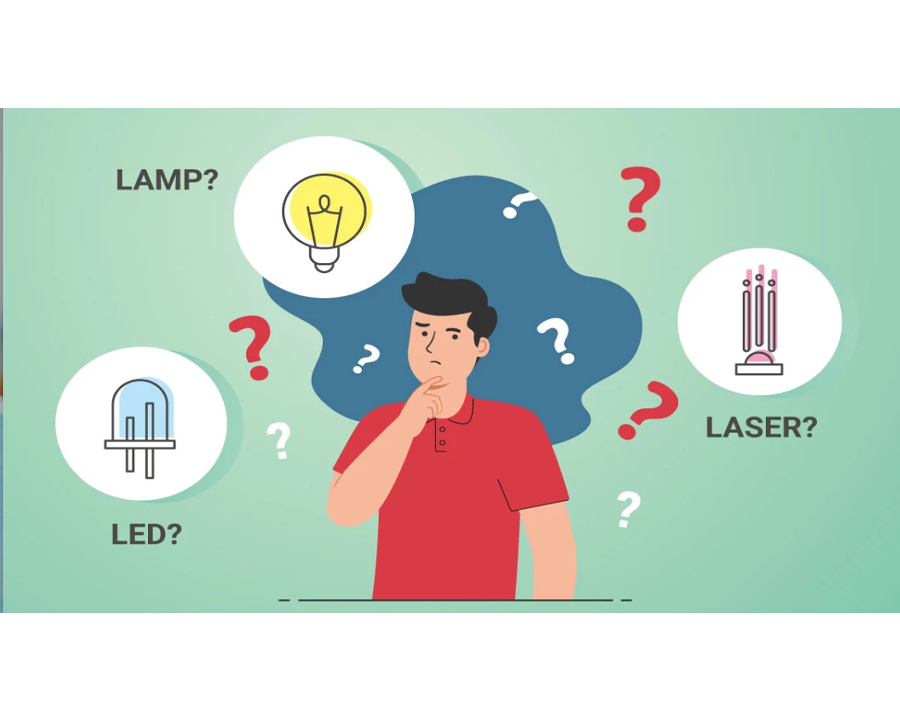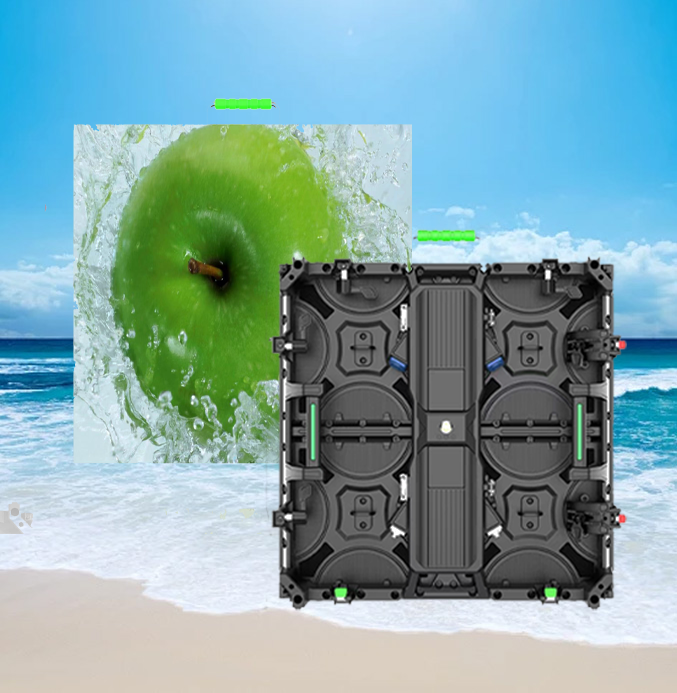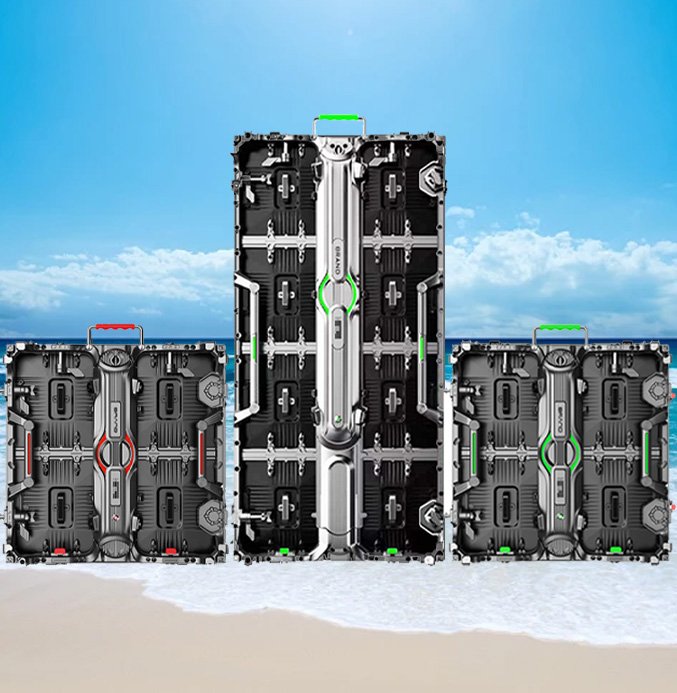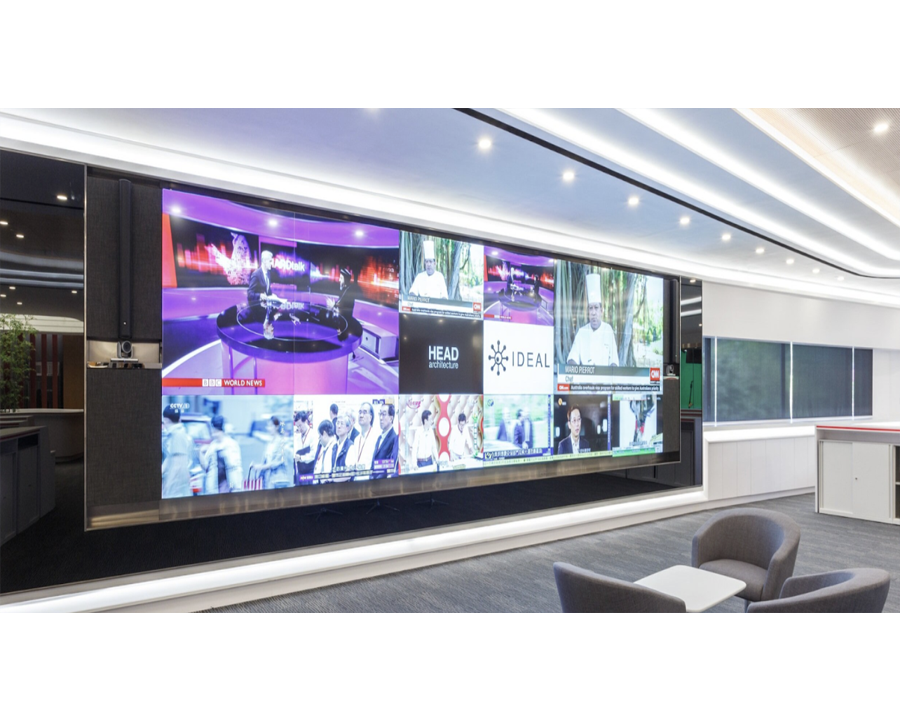
The best projector choice can cause a great difference. But how can you choose between lamp, LED, and laser? Each has its benefits and limitations. Where do you need them? Home theater, office or classroom is going to determine the best choice. Let’s dive in and find your ideal match.
Definition of Projector Types: Lamp, LED, and Laser
Lamp Projectors
The classic options include lamp projectors. They make use of a high-intensity lamp. Usually a metal halide or ultra-high-pressure mercury lamp. For projecting images. These are highly bright. Therefore, it is quite good for large rooms or places with some ambient light. You can be assured of impressive colors and details. Often cheap at the point of sale but more expensive long-term due to the replacement of lamps.
LED Projectors
LED projectors use LEDs and require no lamp replacement. Hence being much more energy-efficient. They are much smaller, lighter, and quite portable either to carry or mount on small spaces. Although not as bright as lamp projectors. They produce consistent, rich colors. LED projectors consume less power. Hence they remain cooler and are quiet to run.
Laser Projectors
These are the newest kind of projectors in the field. With the use of laser diodes, they generate bright and high-contrast images. These laser projectors are super bright. Thus doing good even in bright-lit rooms. Very accurate due to laser light that gives you crystal clear and sharp visuals. Generally the most expensive, though the lowest maintenance.
Key Differences
- Lamp: A bright, low-cost kind, but with lower life and higher maintenance.
- LED: Small, power-saving, long life, yet not very bright.
- Laser: Bright, low maintenance, high image quality. Though a bit more costly.
Comparison: Brightness and Image Quality
Brightness and image quality are two of the most vital concerns when choosing a projector. As each variety offers something different, let’s break it down to help find the best match for your environment.
Brightness: Why It Matters
Brightness affects how clear the image will be. Especially in rooms with natural light. Higher lumens mean a brighter image. You can probably get away with 1,500 to 2,500 lumens for home theaters or dark rooms. But 3,000 lumens or more will serve you better in larger spaces or rooms with windows.
Color Accuracy and Clarity
If color accuracy is what is important, then Lamp projectors are the ones to shine. They tend to show more saturated and natural colors for those photo or movie shots. Again, the laser projectors prove their worth when it comes to contrast and depth, making them perfect for a darker scene. LEDs also show good color accuracy but fall behind in too bright rooms.
Choosing for Your Viewing Environment
- Home Theater: Lamp projectors display brilliant graphics even in darkened rooms. Details appear sharper, colors more vivid.
- Laser projectors with ambient light are highly effective for business or classroom presentations. Since the sustained clarity and color accuracy of the image will keep your professional presentations professional.
- LED projectors marry brightness with durability for a balanced blend. Lighter and easier to carry, setting up for all your portable needs is a breeze.
Lifetime and Maintenance
When one selects an appropriate projector, its lifetime and maintenance become cardinal. Here is a simple guide on how much each projector type lasts-and how to maintain them to continue running smoothly.
Lamp Projectors
Lamp projectors are most often the cheapest. But the trade-off? They have a shorter life. Lamps projectors last between 2,000 to 5,000 hours. That is to say, using your projector daily. You may need a replacement in just about a year or two.
Maintenance Needed:
- Cleaning Cooling System: The lamp projectors run hot. Overheating can result from an accumulation of dust in them; hence, one needs to clean the air filters often. Try cleaning the filter every few months.
LED Projectors
Although not as bright as lamp projectors.
LED projectors also have a longer life. Hence, they are much smaller, lighter, and quite portable.
Maintenance:
- Occasional Cleaning: Even though they produce less heat. It is inevitable that dust will eventually fall upon the cooling system. A quick wipe-down every six months will suffice.
Laser Projectors
Like their lamp counterparts. Laser projectors tend to have rather high lifespans. Hence, they are very bright and sharp. The image quality does not degrade over time.
Maintenance Needed:
- Virtually Maintenance Free: Since laser projectors do not require bulb replacements. The maintenance level is extremely low.
- Filter and Vent Cleaning: Although lasers run much cooler. It is a good practice to keep filters and vents dust-free. A quick cleaning every six months or year will help maintain good airflow.
Which is Best for You?
- Short-term use or tight budget? Then a lamp projector is for you. Just remember, it will require much more frequent maintenance of the bulb.
- Long-term investment, low maintenance? LED and Laser projectors boast of reliability and longevity.
Energy Efficiency and Operating Costs of Projectors
LED Projectors
LED projectors are the best in power efficiency. They use about 30-50 Watts. This is incomparable to those used by other types. They promise a life of as long as 20,000 hours or even more. The lower the wattage. The lesser the consumption of power. Therefore, it will be cheaper over a specific time span. A long life of LEDs also assures you that you will not need to replace them too often, further helping you save money.
Long-Term Cost Savings
The LED projectors will save your money in the long run due to lower power consumption and minimum maintenance.
Laser Projectors
Laser projectors are also similarly very powerful devices. The laser light source burns out after about 20,000 hours which further puts them in the league with LEDs. Bright, dependable, and maintenance is hardly needed for them.
Long-Term Savings
Laser projectors are more expensive on the front end but require virtually no maintenance. With less need for power and long-life light sources. They are highly recommended for that perfect balance of power, brightness, and saving.
Lamp-Based (Bulb) Projectors
Lamp-based projectors use the most power-from 200 to 400 watts. Their bulbs last for around 2,000 to 5,000 hours well below that of LED or laser projectors. You will have to replace the bulb every couple of years. Which adds more cost to your projector.
Long-Term Cost Savings
The lamp-based projectors are much cheaper, whereas in the long run. They will surely cost a lot more in terms of electricity and the replacement of bulbs. Therefore, this may not be your best bet if you’re looking to save money over time.
Which Projector is Best for Which Situation?
Want to know what projector to use for what purpose? Read on to find the best projector for these and several scenarios, their pros and cons, and how each type can meet your unique needs.
Lamp Projectors
Best for: Infrequent use in the home or locations where the need for brightness outweighs the frequency and bother of lamp replacement.
Use Cases:
- You are using it on movie nights or gaming in a darkened room.
- You want a big screen but don’t want to pay all that much.
- It’s for a home theater experience, but on a budget.
Pros:
- High brightness
- Ideal for dark rooms
- Image really pops
- Affordable, cheaper than LED and laser.
- Wide range of sizes and brands
Disadvantages
- Shorter lifespan: usually 3,000-5,000 hours for the lamp bulb.
If you want more of the projector from the past. You do not mind maintaining this machine from time to time. Then this lamp projector is for you. Just ensure that you have a darker room to enjoy your projector to its fullest capacity.
LED Projectors
Best suited for: small-sized rooms, on-the-go setups, or users who want to lessen projector maintenance.
Use Cases
- Presentations in meeting rooms or lectures
- You require a mobile alternative to migrate to different rooms or sites.
- Your session of viewing is relatively shorter: movies, slideshows, quick gaming.
Pros
- LEDs last long in terms of lifespan.
- LEDs also provide lower power consumption and low heat output.
- Low maintenance: No worrying about constant bulb replacements.
Cons
- Less bright: Poor efficiency in LED projectors in a well-lit room
- Less size option: Not ideal for very large screens
- Might not offer as high a contrast: Some colors might appear softer.
If your needs are for simple, low-maintenance uses involving small gatherings, presentations. Just a quick show, then the LED projector shall suffice. Its portability and long-lasting bulb make it excellent for on-the-go use or infrequent viewings.
Laser Projectors
Best for: Professional presentations, home theaters, or wherever long-term high-level performance is important.
Use Cases
- You are building a top-notch home theater and want cinema-level quality.
- You are running daily presentations or displays in bright rooms.
- You are setting up projectors for commercial use-like a store or exhibition.
Pros
- Superb brightness: Laser projectors do well with ambient light.
- High contrast and color accuracy: Best suited for bright and sharp images.
- Long life: Some lasers last 20,000-30,000 hours or more.
Cons
- Expensive: Laser projectors are a bit more expensive.
- Less portable: They are larger and heavier on average.
- It may require professional installation. Not all laser projectors are plug-and-play.
If you need quality, yes, and are looking at investing in something more permanent. Then a laser projector is what you need. Perfect for bright or well-lit rooms, living rooms, conference rooms, or commercial display purposes.
Which projector is right for you?
If you want to save a buck and don’t mind periodic maintenance, the choice needs to be the lamp projector. If you want something compact, reliable, and bright, look at LEDs Projector. And if you want the best quality and staying bright, turn to a laser projector. Each projector will bring with it a different experience. So pick the one that best matches up with your needs!
Conclusion
Ultimately, it’s up to you to decide what you truly need. A lamp, LED, or laser-all shine in their own way. Consider your space, budget, and use. Go at the right pace. Choose what best suits you. Your perfect viewing experience awaits you!

Enter the digital world with our advanced display technologies.





